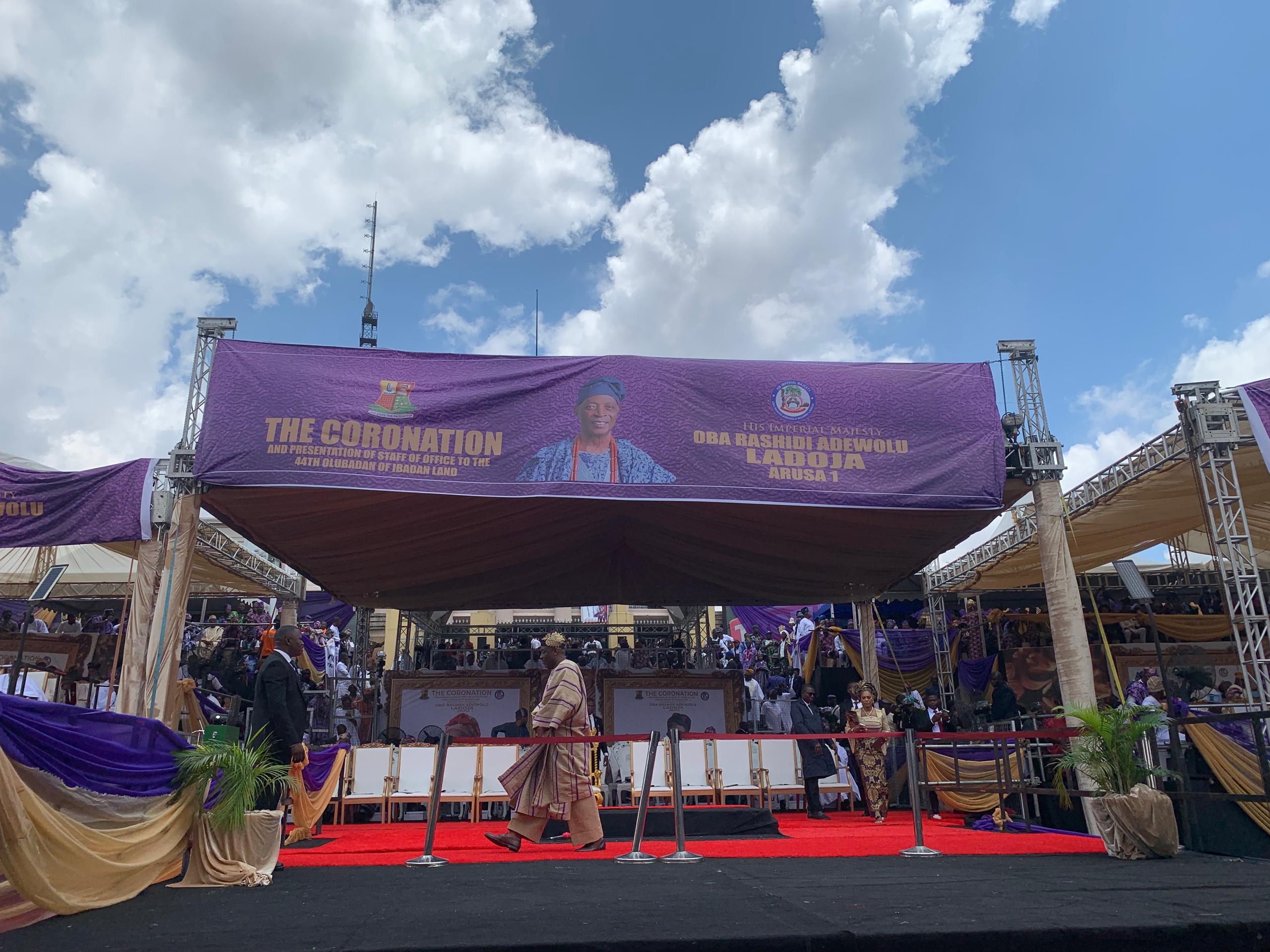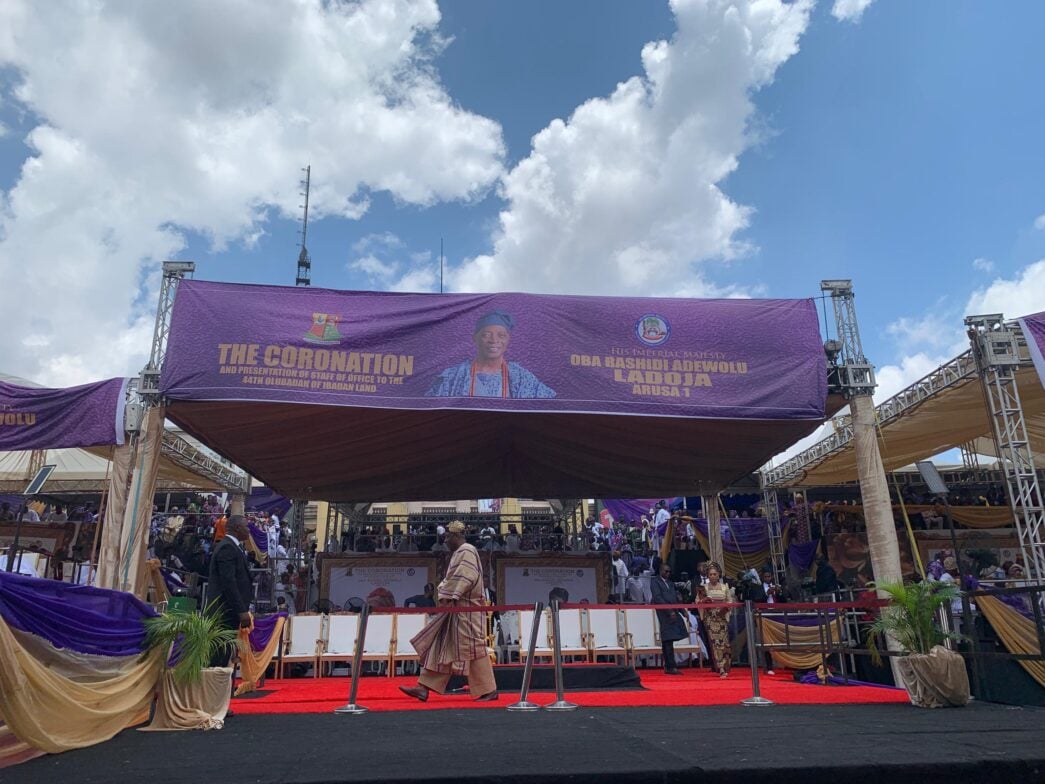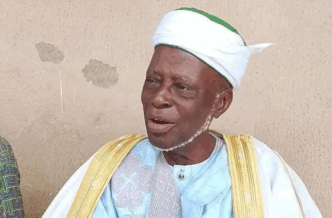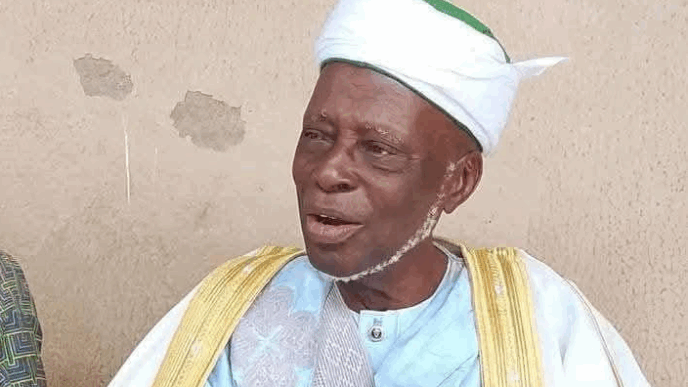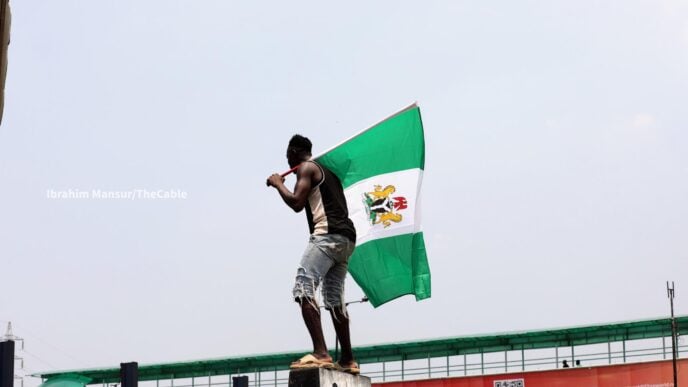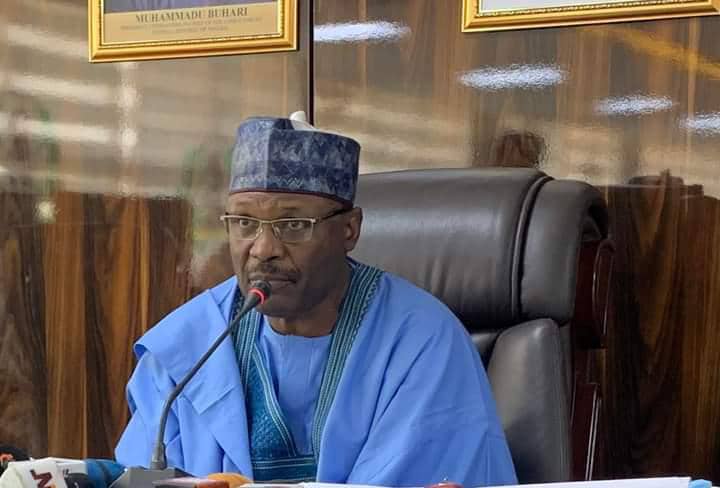Ibadan, Oyo state, the city of warriors, quaked last Friday. The rumbling vibrations of the historic coronation of ex-Governor Rashidi Ladoja as Olubadan sent valleys into a seismic shake. Ibadan’s ancient event centre, Mapo Hall, was nearly submerged with excited feet. Children of Oluyole were at the zenith of their excitement. Expensive automobiles, resplendent attire and infectious joy lit the faces of a people who christened self as cunning. That Friday, however, Ibadan wasn’t ready to listen to the rhythm of its famous Láyípo christening. It was rather ready to receive the world.
Suddenly, a huge blot appeared on the landscape. In the eyes of the world, àjàò, the animal called sloth, suddenly crept up the hill of Mapo. When àjàò creeps up on an event like this, it is a moment of anomaly, anomie or dystopia. Yoruba then speak in dispraise of this unusually created, amoebic-shaped animal. They say, Kinní kan ba àjàò jé̩, apá rẹ gùn ju itan lọ – the only blot in àjàò’s creation is that its arms are disproportionately longer than the legs.
Many have questioned àjàò’s mis-taxonomy, especially one that equated it with the sloth. To them, àjàò is not a sloth but a flying squirrel. In terms of features, both sloth and flying squirrel strike a resemblance with the Yoruba àjàò, in that they possess disproportionate arms and legs. Apart from these features, the sloth is also the world’s slowest mammal. Flying squirrel, however, is a gliding mammal which is more of a squirrel than any other mammal. Unless àjàò is today extinct, both equivalents it shares features with – sloth and flying squirrel – do not belong to the African habitat. While the sloth’s habitat is the tropical rainforest of Central and South America, the flying squirrel lives in North America, Northern Eurasia, and the temperate, tropical forests of India and Asia. Features-wise, àjàò however slants more towards the sloth.
Sorry, I digressed. On Friday, àjàò appeared in Mapo. It came in the form of the official musician of the coronation event, Taiye Akande Adebisi, famously known as Taiye Currency. Many felt that, even if the need was to Ibadan-ize the Olubadan coronation, for a city which parades A-list musical wizards like Saheed Osupa, Currency was not apropos for an event of that high-octane magnitude. They felt justified when, perhaps seized by an unknown muse of Apollo, Greek mythology’s central deity and embodiment of the spirit of music, Taiye Currency suddenly and seemingly veered off-theme and sang, “Wèrè l’a fi ńwo wèrè…” – madness is the curative medicine for insanity.
Advertisement
Instantly, the musician courted huge flak from his audience for this perceived off-key musical line. The crowd felt nostalgia for Awurebe exponent, Alhaji Dauda Akanni Adeeyo, popularly known as Epo Akara. Epo’s evergreen tributes to Oba Daniel Adebiyi and Gbadamosi Akanbi Adebimpe, the latter being the 35th Olubadan of Ibadan, who reigned briefly from February 1976 until his death in July 1977, are still considered classics. A typical song sang at political rallies where call for the Mosaic an-eye-for-an-eye is often rife, “Wèrè l’a fi ńwo wèrè…” was seen as an anti-climax among the Ibadan people who, for once, forgot political schisms and were united in celebrating their new king.
Unbeknownst to the crowd, Taiye Currency was indeed right and deserves our praise. While madness is of a truth cure for madness, on the converse, on that Friday, could the musician have been lost in the mire of the literary device of dramatic irony? In dramatic irony, though the character in the story is oblivious of the situation he plays a vital role in, the audience is aware of it. It then leads to a gap or contrast between what the audience knows and what the character understands. While all of us as audience saw contradictory meanings in Currency’s “Wèrè l’a fi ńwo wèrè…” and the theme of the coronation event, the musician might be communicating a deeper suspense of humour and existential tragedy.
Talking specifics now, could Taiye Currency in Mapo, by that song, be espousing the Madman Theory?
Advertisement
Indigenous psychiatrists who specialise in the treatment of lunatics and allied mental ailments pioneered this “Wèrè l’a fi ńwo wèrè…” phrase. The earliest theories on madness believed it was a spiritual affliction. The assumption was that its victims had their minds possessed by an alien deity. While many also believed madness was hereditary, others believed it was a punishment from the gods, resulting from a gross disregard of the gods’ warning. Then came Hippocrates (460–377 B.C.) and the theories of madness shifted to the belief that most bodily illnesses were as a result of various imbalances in the body. Even with this, madness, abnormalities of behaviour and epilepsy were still generally believed to be the workings of the gods. This prompted Hippocrates to write his treatise, The Sacred Disease, where he argued that epilepsy, for instance, was natural rather than of a supernatural origin. “It … appears to me to be in no way more divine, nor more sacred than other diseases…” he wrote.
It is generally believed that, since insanity is a hardcore ailment, its treatment is also hardcore. I witnessed this in the early 1980s when I followed my late father to hire farmhands from the indigenous sanatorium of Baba Aladokun of Ikirun, now Osun State. I saw mentally challenged men and women wickedly shellacked with whips. In his work, Madness and Civilisation, Michel Foucault dealt with the emergence of different aspects of madness in pre-modern Western Europe. Unfortunately, as against what Foucault taught, most indigenous psychiatrists believe that, in the treatment of insanity, whipping is an essential curative dose.
In Yoruba’s main translation of the word, “madness” or “madman” is synonymous with wèrè. It even appeared in Samuel Ajayi Crowther’s Yoruba-English dictionary of the nineteenth century. Madness is also synonymous with “foolish or silly person” or someone who acts in a queer manner. In 1860, when Elizabeth, wife of the Reverend Theophilus Packard acted queer, he had her committed to the Illinois State Asylum at Jacksonville. In her relations with her neighbours, it was said that very little in Elizabeth Packard’s appearance or behaviour suggested madness. What gave Reverend Packard an impression of her “madness” was her “offense” of openly disagreeing with him on religious matters within his church. In Mrs Packard’s defence, she insisted that her husband had her locked up in the sanatorium “for simply expressing religious opinions in a community who were unprepared to appreciate and understand them”. According to the Illinois Commitment Law of 1851, Packard’s sanity or madness was immaterial. In Illinois of the time, married women were often prone to being held in asylums indefinitely, the strength of their committal being solely the authority of their husbands.
The logic of the Madman theory in national leadership was first articulated by Daniel Ellsberg in 1959, followed by Thomas Schelling, in 1960. It is a political theory usually attributed to American president Richard Nixon’s foreign policy. It is derived from Niccolo Machiavelli’s 1517 book, Disco
Advertisement
Last Friday in Ibadan, Oba Ladoja received one of the greatest honours of his coronation as President Bola Tinubu graced the historic occasion. When it was time to address the audience, the president gave an inkling of what would be his address to Nigerians on Wednesday, Nigeria’s 65th anniversary. In an admixture of felicitations to the new monarch and a message of hope to the Nigerian populace, Tinubu declared that the country’s economic suffering was now back-flung, just the same way a masquerade flings his loose regalia. “Today, I am honoured and feel very proud to give you the cheering news that the economy has turned a corner. There is a bright light at the end of the tunnel. Your suffering has been as painful to us as a painful surgery. But the economy has now returned to a moment of growth and prosperity. Thank you for your perseverance, and thank you for your endurance,” he sermonised.
Here we go again. My first reading of the above claim of the president is that he has been so extensively hypnotised by his voodoo economists that he has crossed the Rubicon of reality. Or, that he has mouthed this economic recovery shibboleth for too long, that the phrase sounds more like an ad-lib motivational speech that must be repeated like a musical refrain. Other than in the Utopian minds of his minders and in the renteer perception of regime fawners, there is no economic recovery in Nigeria, nor has the economy of the average Nigerian turned any corner. It is still in a long sprint.
When this government came in 2023, its demeanour was equal to the biblical “My father (Buhari) scourged you with whips; I will scourge you with scorpions”. At that time, some Nigerians thought, queerly, that though the Madman theory was a concept in international relations, the Nigerian government wanted to suborn obedience by creating economic fear in the minds of the people. With this ad-lib mouthing of the refrain of economic recovery on paper by the president and his team, when in actual fact, reality counters this claim, it seems to occur to Nigerians that the government is simply telling them to go jump inside Kudeti River if they do not believe it. Or that a pure Madman theory is at work.
Where Nigerians would have liked to see their president engaged in the Madman theory, like Nixon or Trump, is in madly pushing the Nigerian agenda on the global space. However, rather than the proverbial sexually sterile man heeding the push to thrust into the expected space, he flaunts his capability to thrust a thread inside the tiny orifice of the needle, even in the dark. As it stands now, Nigeria may be an object of scorn in the international circle at the moment. Laolu Akande, Channels Television’s Inside Sources programme anchor, brought the dilemma home grimly. Last week, he suggested convincingly, in the words of that Yoruba saying, that there is danger in the farm of Longẹ. For our president to be absent at UNGA for two consecutive years, thus missing out on this world’s largest multilateral gathering, is ominous. At such diplomatic gathering of world powers, said Akande, “presence is power and absence is noticed.” The danger then is, said Akande, echoing the words of an ex-US Secretary of State, “if you are not at the table, you will be on the menu.” Why would a president who is quick to junket to Paris and London at the drop of a hat be reluctant in travelling to the United States to strike deals that will lift Nigeria? Curiouser and curiouser.
Advertisement
I just finished reading late Nigeria’s foremost professor of history, Festus Ade-Ajayi’s keynote at the first convocation of the Nigerian Academy of Letters (1999). It was aptly titled, “Development is about the people”. The problem with Nigerian leaders, this current ensemble not excluded, Ade-Ajayi said, is that they are selfish in their prescriptions. While building all their economic and social models, seldom do they enquire what the wishes of the people are. Wherever there is the mouthing of the word ‘development’ and there is no ample recourse to improved quality of people’s life, what we have is regression.
The statistical indicators that the Tinubu team claimed show it that Nigerians are enjoying better times are meaningless if the woman in Oyingbo market cannot agree with them. Same thing with the collapsing inflation rates, which they hoist like a scientist who just discovered a fallen object from mass. Those statistics are meaningless if we go to the pharmacy and drugs are still sold at cut-throat prices as they are, and our purchasing power is still this lean. Only the Madman theory can explain why leaders would taunt their people with the existence of a surplus when, indeed, there is what looks like a famine.
Advertisement
What the president obviously confuses for the general well-being of the people is the flamboyance and the personal economies of his ministers. Indeed, these have “turned a corner”. The talk out there is that his ministers are literally buying up Uranus and Mars with illicit, ill-got wealth that will shame Sambo Dasuki’s arms money-gate and Diezani Allison-Madueke’s alleged
The Tinubu pain-before-prosperity mantra is appearing as a huge scam. At the UNGA, it was said that about five dozen presidential aides were ship-loaded to the US, with their big fat estacodes. These are the ones whose economies are turning the corner. The endure-now-to-
Advertisement
So, the president knew that Nigerians’ suffering “has been…as painful surgery”? Interesting. This analogy even makes the situation worse. Surgical procedures are preceded by anaesthesia and followed with analgesics to reduce pain. They are then accompanied by a post-procedure process of recovery and care. None of these did the government administer before yanking us open with its wicked scalpel in May 2023. Nor even thereafter. Many of our compatriots have died needless deaths and many are still dying.
So, when Taiye Currency sang about “Wèrè l’a fi ńwo wèrè…”, flesh and blood obviously didn’t reveal it to him. He was a seer. Either intended or a dramatic irony, what the musician was
Advertisement
Views expressed by contributors are strictly personal and not of TheCable.

